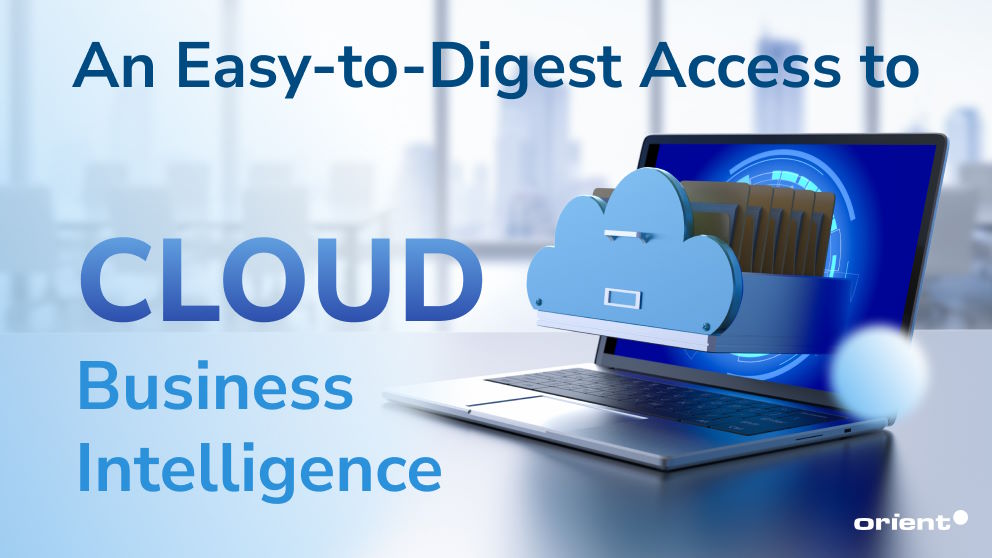An Easy-to-Digest Access to Cloud Business Intelligence

Content Map
More chaptersFrom 2024 to 2030, the global cloud computing market is assessed to enlarge at a CAGR of 20%, and cloud business intelligence (BI) is expected to be one of the major contributors to this growth. This indicates that more and more businesses are moving towards cloud-based BI solutions, recognizing the potential benefits they can bring to the table.
But why choose cloud-based BI solutions over traditional ones? Cloud BI will no longer be considered one of the future trends or fads but a standard way to stabilize and optimize business performance. This shall be the simplest and most straightforward instruction to cloud business intelligence that you may come across. Let’s not wait a single moment and jump into the explanation.
What Is Cloud BI (Business Intelligence)?

First and foremost, what do you know about business intelligence or BI? For rookies, business intelligence is a terminology devised to depict the technology-driven process of analyzing data and transforming information into actionable insights.
BI is coupled with a suite of tools, applications, and methodologies that aid corporate executives, business managers, and other business users in making data-driven decisions.
The BI tools enable gathering and extracting data from various existing data sources (both internal and external), preparing it for data visualization and analysis, developing and running queries against the data, generating reports, and creating dashboards to showcase the results of their analysis.
When cloud computing serves the cause of business intelligence, we have “cloud BI.” How does cloud BI work? By nature, its functionality of business analytics remains similar to traditional BI - to provide a comprehensive view of the business processes through the current and historical data insights stored in a centralized data warehouse - yet the difference lies in the method of hosting.
The concept of cloud business intelligence solutions, sometimes known as software-as-a-service (SaaS), enables adopters to access data analytics, data management, and business intelligence capabilities through cloud services (Including public cloud, private cloud, and hybrid cloud) instead of relying on on-premises BI infrastructure. A few big names in cloud BI software offerings are Salesforce Wave Analytics, Microsoft Power BI, and SAP Business Intelligence.
Significant Advantages of Adopting Cloud BI Solutions
Now, why should you consider cloud business intelligence tools? Is it merely because of the hype surrounding the word “cloud”? Absolutely not! The following are a few major benefits that make cloud business intelligence worthy of your consideration.
Simple Setup & Swift Deployment
In contrast with desktop business intelligence applications, which are burdened with lengthy setup processes and limitations, cloud BI tools are internet-based and do not call for any significant installation or infrastructure costs.
Plus, the cloud solutions are made user-friendly and hassle-free to implement; therefore, adopters can get started with reduced IT involvement. This means cloud-based BI software can be up and running across devices in a matter of days or weeks. Additionally, a cloud BI tool is maintained and updated frequently by a service provider, which relieves you from the burden of manual maintenance and upgrades.
Cost-effectiveness
With no physical installations or hardware to purchase, cloud BI platforms do well in cutting up-front expenses. A business intelligence tool can be availed at a fraction of the cost compared to traditional BI software with equivalent functionalities.
Additionally, the subscription-based pricing model gives you the flexibility to pay for only the services and computing resources you use and ramp up or down in alignment with how your business workflows and needs fluctuate. You will save quite a large amount of money on hardware upgrades and maintenance, along with licensing fees charged by traditional on-premises software vendors. Last but not least, business users can consider cutting down on the on-site servers and freeing their staff from day-to-day operations, freeing their funds to go where necessary.
Unparallel Mobility
Obviously, on-premises BI tools stand no chance against cloud-hosted ones in terms of mobility. Users no longer need to stick to their desktops to tap into data and processing resources, while the remote access feature of cloud applications offers the convenience of access from anywhere at any time, as long as you have a working internet connection and can open web browsers.
Thankfully, cloud infrastructure empowers decision-makers with real-time data access that allows them to break down data silos and operate efficiently on the go with no location, device, or delay restrictions, thus enhancing collaboration and data sharing between teams and individuals.
Security
While the topic of data security in the cloud computing environment may raise concerns, it is worth noting that reputable cloud BI providers invest heavily in security measures. Data encryption, user authentication, intrusion detection systems, and regular security audits are a few of the ways that cloud providers safeguard your data.
Easy Integration
More often than not, traditional on-premises infrastructure demands complex data integration procedures; a cloud BI solution makes it much easier.
Such internet-based software comes pre-built with in-built connectors for popular databases, file formats, and third-party applications (e.g., customer relationship management, enterprise resource planning, data warehousing, etc.) that make it less tense to stream in data across different platforms without any loss or latency issues.
Cloud-based Business Intelligence in Practice: Top Common Use Cases

In an interconnected world where businesses are generating and accumulating vast volumes of structured and unstructured data at high rates, it is no surprise for BI practitioners to shift their focus from traditional on-premises to cloud BI solutions due to the numerous benefits we just mentioned above. Let’s run through a few common use cases:
Reporting & Dashboards
With a cloud BI platform, you are able to generate concise reports and interactive dashboards to intuitively showcase data insights gathered from multiple sources in one place.
These tools enable monitoring key performance indicators (KPIs), analyzing future trends, tracking progress against targets, and sharing visualizations with stakeholders seamlessly. Additionally, the accessibility of real-time data allows teams to make faster business decisions and remain informed.
Predictive Analytics
Cloud-based business intelligence solutions are commonly used for not only data mining or effective root cause analysis but also predictive analysis. With advanced analytics capabilities, business decision-makers can forecast future outcomes and trends based on historical and current data accumulated in the cloud.
By taking advantage of statistical models and machine learning algorithms, BI practitioners can turn their cloud platforms into valuable sources of data. This facilitates quick and real-time insights into market shifts, customer behavior patterns, and potential business opportunities.
Data Warehousing
Cloud-based data warehouses can handle massive volumes of structured and unstructured data at a fraction of the cost that traditional warehouses would consume. Additionally, cloud BI solutions support advanced analytics methods like machine learning and artificial intelligence, which aid businesses in deriving meaningful insights and supporting informed decision-making.
Data Visualization
Data visualization tools offered by cloud-based BI platforms enable users to convert large volumes of raw data into visually intuitive and interactive formats such as charts, graphs, and heatmaps. Such visual representations of data simplify complex data sets, making it easier to identify patterns, correlations, and trends that might go unnoticed in traditional reports.
Online File Collaboration and Sharing
Cloud-based BI platforms also facilitate better collaboration and sharing of information within an organization. Data is stored in the cloud, so it can be accessed and shared by any authorized individual, irrespective of their geographical location. This feature makes it easier to exchange information among teams and departments. Moreover, cloud BI tools often come with features that let users annotate and comment on data reports and visualizations, fostering a more collaborative and interactive analysis process.
Closing Thoughts
Data is the lifeblood of any modern business, and those who hold a grasp over the power to analyze data and uncover insights for decision-making can gain an edge over other competitors. That’s the business intelligence we are talking about. The embracement of cloud BI tools and solutions has become a necessity in today’s data-driven world, and those who fail to recognize this fact risk being left behind. So, whether you are an SME or a large enterprise, the key advantages of cloud-based business intelligence discussed above should clarify why it is crucial to opt for it rather than on-premises BI.
If you need advice or guidance from domain experts, get in touch with us - Orient Software. We are an IT powerhouse specializing in custom software development of various categories and IT consulting services. Want to discover what Orient is capable of doing for your business? Contact us for further discussion.







